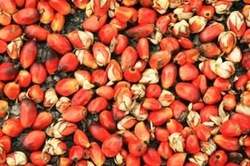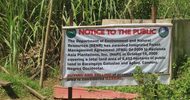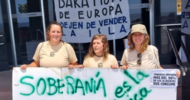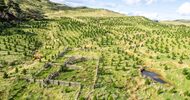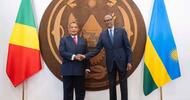ProactiveInvestors | 9 September 2011
7:44 am by Jason Chew Feronia is not only planting palm, it is growing rice, fruit and beans, and has its eyes on producing lime and fertilizers
Feronia Inc. got into the palm oil business in September 2009 through the purchase of a 100,000 hectare plantation in the Democratic Republic of Congo (DRC) from Unilever. Within the plantation lies 15,000 hectares of oil palm in production and another 55,000 hectares suitable for planting. The company’s other main division is focused on large-scale mechanized farming, modeled after methods successfully implemented in Brazil.
Amazingly, 60% of the world’s remaining untilled arable farmland is in Africa, according to a McKinsey Global Institute report. Soaring crop prices have made farms a popular investment leading many to buy cheap land in Africa. Unfortunately, these farms typically grew crops for export, reducing arable land for Africans.
Feronia has committed itself to protecting the environment, supporting the local community and sustainable agriculture- a difficult creed to live by. It is the only oil palm company that is expanding without any form or deforestation. Unique to Feronia, all new growth is from previously abandoned palm plantations. No virgin forests are touched.
The company anticipates a planting rate of 2,000 hectares this year and 5,000 per year thereafter. With over 50,000 hectares of inventory, the company has enough land until 2021. As that date nears, it will look to acquire additional abandoned plantations along the River Congo, including palm, rubber, and sugar plantations.
Yet this has not hindered the company’s growth. Building on the belief that Africa should and will be a self-sufficient food producer, Feronia has brought together the best in agricultural technology and practices with the goal of becoming a world-class operation. Its laudable objective is to free Africa from dependence on food imports, transforming the continent into a net exporter.
There is substantial potential for growth within continental Africa; even within the DRC alone palm oil needs exceed production capacity. This is due to a combination of population and income growth, along with government incentives that make biofuel prices more competitive with crude oil. Expansion of the current plantation, re-establishment of proper planting, and lifecycle management will contribute to revenue growth. The company aims to finance its growth through existing cash flows.
Congo has an ideal climate for farming, with consistent rainfall and moderate year-round temperatures. Conditions are often compared to the highly productive agricultural regions of Brazil. Crops grow year-round, allowing three rotational harvests annually. With 80 million hectares of arable land, the potential is indeed huge. Feronia has so far accumulated 20,000 hectares of farmland.
Feronia’s palm oil division employs over 4,000 individuals in three smaller plantations that make up its total land concessions. The three are Lokutu, Yaligimba, and Boteka. Over 2.2 million mature palm trees and 300,000 seedlings are spread out across the plantations. Three principle products are produced, crude palm oil, palm kernal oil, and palm kernel expeller.
All crude palm oil and palm kernal oil is sold to domestic refiners in the DRC for the production of cooking oils, soaps, and other consumer goods. Palm kernel expeller is currently fed to company livestock; as production expands, excess will be sold to local farmers and into export markets as a high-value livestock feed.
This year marks the 100th year of operations at Feronia’s oil palm plantations. This lengthy stewardship has led to decades of seed breeding experience, making Yaligimba Research Station, Feronia’s seed development program, one of the most extensive in the industry. Yaligimaba specializes in sub-Saharan oil palms and has 50,000 individual plants under detailed observation at any one time. The program has selected the best material from Nigeria, Ivory Coast, Cameroon, and of course, the DRC.
Selective breeding has yielded palms with such desirable traits as disease resistance, early yields, and exceptional bunch characteristics. Seeds have been produced to ensure high rates of germination. Great care is taken to ensure each seed is free from disease when shipped to customers. In May, Feronia received an order for 756,000 oil palm seeds from a West African operator, representing the company’s largest order to date.
Feronia’s arable farms consist of partnerships between landowners and the company with the landowner gaining a share of profits through technology and expertise contributed by Feronia. Land is divided into 2,000 hectare units for ease of management while tractors and combines are imported to maximize productivity. The company seeks to rehabilitate run-down farmland through modern agricultural techniques, improving efficiency through economies of scale. This follows the same philosophy used in acquiring palm plantations. Land that requires the removal of anything more than “grass and scrub” is unwanted.
Some of the processes Feronia has introduced are crop rotation, fertilizer management, and land preparation. Crop rotation reduces the risk of plant disease and maintains long-term productivity of the soil. Hi-tech GPS aided hectare by hectare soil analysis helps accurately dictate the proper amount of fertilizers needed, minimizing pollution from run-off and excess consumption. A no-till farming method used to prepare the land helps prevent moisture loss and soil damage.
Crops being planted include rice, beans, fruits and vegetables. Both rice and beans play an important role in African diets. Less reliance on imported rice will aid in boosting food security in Africa. 1,027 hectares were planted this year, including 111 hectares of rice in March. A milestone was reached with in September with the planting of 2000 hectares of rice during this rainiest of seasons.
Due to the high cost of fertilizer and abundance of limestone in the DRC, Feronia established a subsidiary in May to pursue the production of agricultural lime and other fertilizers. The vertical integration is a bit risky and contains significant upfront costs, but the company is betting growing demand from its own operations along with the development of large-scale agriculture in the region will make it worthwhile. A feasibility study has been initiated.
Feronia isn’t only about being environmentally conscious; it also aims to increase shareholder value. To that end revenue for the three months ended June 30 rose 41% to $1.61 million from $1.14 million in the year-ago quarter. Palm oil production rose 36% to 2,231 tons from the previous year. Net income jumped to $1.87 million compared to a $1.60 million loss as a result of a $4.60 million gain recognized in the second quarter for the revaluation of biological assets. The company ended the quarter with $27.88 million in cash.
The substantial capital will allow Feronia to continue investing in its key programs; accelerating the expansion of its oil palm plantations by increasing plantings and building a new high throughput palm oil mill, rehabilitating its seed production facility, and expanding arable farming operations. The funds also provide Feronia the flexibility to finance its new fertilizer venture on its own if necessary. As revenue and efficiencies increase, the company is well on the way to becoming a profitable operation.
7:44 am by Jason Chew Feronia is not only planting palm, it is growing rice, fruit and beans, and has its eyes on producing lime and fertilizers
Feronia Inc. got into the palm oil business in September 2009 through the purchase of a 100,000 hectare plantation in the Democratic Republic of Congo (DRC) from Unilever. Within the plantation lies 15,000 hectares of oil palm in production and another 55,000 hectares suitable for planting. The company’s other main division is focused on large-scale mechanized farming, modeled after methods successfully implemented in Brazil.
Amazingly, 60% of the world’s remaining untilled arable farmland is in Africa, according to a McKinsey Global Institute report. Soaring crop prices have made farms a popular investment leading many to buy cheap land in Africa. Unfortunately, these farms typically grew crops for export, reducing arable land for Africans.
Feronia has committed itself to protecting the environment, supporting the local community and sustainable agriculture- a difficult creed to live by. It is the only oil palm company that is expanding without any form or deforestation. Unique to Feronia, all new growth is from previously abandoned palm plantations. No virgin forests are touched.
The company anticipates a planting rate of 2,000 hectares this year and 5,000 per year thereafter. With over 50,000 hectares of inventory, the company has enough land until 2021. As that date nears, it will look to acquire additional abandoned plantations along the River Congo, including palm, rubber, and sugar plantations.
Yet this has not hindered the company’s growth. Building on the belief that Africa should and will be a self-sufficient food producer, Feronia has brought together the best in agricultural technology and practices with the goal of becoming a world-class operation. Its laudable objective is to free Africa from dependence on food imports, transforming the continent into a net exporter.
There is substantial potential for growth within continental Africa; even within the DRC alone palm oil needs exceed production capacity. This is due to a combination of population and income growth, along with government incentives that make biofuel prices more competitive with crude oil. Expansion of the current plantation, re-establishment of proper planting, and lifecycle management will contribute to revenue growth. The company aims to finance its growth through existing cash flows.
Congo has an ideal climate for farming, with consistent rainfall and moderate year-round temperatures. Conditions are often compared to the highly productive agricultural regions of Brazil. Crops grow year-round, allowing three rotational harvests annually. With 80 million hectares of arable land, the potential is indeed huge. Feronia has so far accumulated 20,000 hectares of farmland.
Feronia’s palm oil division employs over 4,000 individuals in three smaller plantations that make up its total land concessions. The three are Lokutu, Yaligimba, and Boteka. Over 2.2 million mature palm trees and 300,000 seedlings are spread out across the plantations. Three principle products are produced, crude palm oil, palm kernal oil, and palm kernel expeller.
All crude palm oil and palm kernal oil is sold to domestic refiners in the DRC for the production of cooking oils, soaps, and other consumer goods. Palm kernel expeller is currently fed to company livestock; as production expands, excess will be sold to local farmers and into export markets as a high-value livestock feed.
This year marks the 100th year of operations at Feronia’s oil palm plantations. This lengthy stewardship has led to decades of seed breeding experience, making Yaligimba Research Station, Feronia’s seed development program, one of the most extensive in the industry. Yaligimaba specializes in sub-Saharan oil palms and has 50,000 individual plants under detailed observation at any one time. The program has selected the best material from Nigeria, Ivory Coast, Cameroon, and of course, the DRC.
Selective breeding has yielded palms with such desirable traits as disease resistance, early yields, and exceptional bunch characteristics. Seeds have been produced to ensure high rates of germination. Great care is taken to ensure each seed is free from disease when shipped to customers. In May, Feronia received an order for 756,000 oil palm seeds from a West African operator, representing the company’s largest order to date.
Feronia’s arable farms consist of partnerships between landowners and the company with the landowner gaining a share of profits through technology and expertise contributed by Feronia. Land is divided into 2,000 hectare units for ease of management while tractors and combines are imported to maximize productivity. The company seeks to rehabilitate run-down farmland through modern agricultural techniques, improving efficiency through economies of scale. This follows the same philosophy used in acquiring palm plantations. Land that requires the removal of anything more than “grass and scrub” is unwanted.
Some of the processes Feronia has introduced are crop rotation, fertilizer management, and land preparation. Crop rotation reduces the risk of plant disease and maintains long-term productivity of the soil. Hi-tech GPS aided hectare by hectare soil analysis helps accurately dictate the proper amount of fertilizers needed, minimizing pollution from run-off and excess consumption. A no-till farming method used to prepare the land helps prevent moisture loss and soil damage.
Crops being planted include rice, beans, fruits and vegetables. Both rice and beans play an important role in African diets. Less reliance on imported rice will aid in boosting food security in Africa. 1,027 hectares were planted this year, including 111 hectares of rice in March. A milestone was reached with in September with the planting of 2000 hectares of rice during this rainiest of seasons.
Due to the high cost of fertilizer and abundance of limestone in the DRC, Feronia established a subsidiary in May to pursue the production of agricultural lime and other fertilizers. The vertical integration is a bit risky and contains significant upfront costs, but the company is betting growing demand from its own operations along with the development of large-scale agriculture in the region will make it worthwhile. A feasibility study has been initiated.
Feronia isn’t only about being environmentally conscious; it also aims to increase shareholder value. To that end revenue for the three months ended June 30 rose 41% to $1.61 million from $1.14 million in the year-ago quarter. Palm oil production rose 36% to 2,231 tons from the previous year. Net income jumped to $1.87 million compared to a $1.60 million loss as a result of a $4.60 million gain recognized in the second quarter for the revaluation of biological assets. The company ended the quarter with $27.88 million in cash.
The substantial capital will allow Feronia to continue investing in its key programs; accelerating the expansion of its oil palm plantations by increasing plantings and building a new high throughput palm oil mill, rehabilitating its seed production facility, and expanding arable farming operations. The funds also provide Feronia the flexibility to finance its new fertilizer venture on its own if necessary. As revenue and efficiencies increase, the company is well on the way to becoming a profitable operation.


